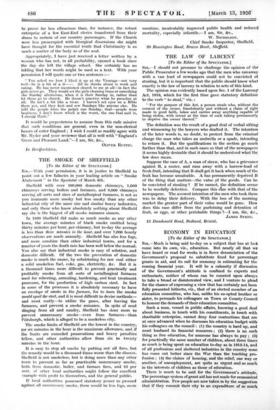THE LAW OF LARCENY [To the Editor of the SPECTATOR.]
• should not presume to challenge the opinion of the Public Prosecutor a few weeks ago that the men who ran away with a van load of newspapers could not be convicted of stealing, but it is important that the public should know what exactly is the law of larceny in relation to acts of this kind.
The opinion was evidently based upon Sec. 1 of the Larceny Act, 1916, which for the first time gave statutory definition to the verb " to steal," viz. :
" For the purpose of this Act, a person steals who, without the consent of the owner, fraudulently and without a claim of right made in good faith, takes and carries away anything capable of being stolen, with intent at the time of such taking permanently to deprive the owner thereof."
The definition was the result of a good deal of verbal sifting and winnowing by the lawyers who drafted it. The intention of the later words is, no doubt, to protect from the criminal charge the man who takes an umbrella or a spade, intending to return it. But the qualifications in the section go much further than that, and in such cases as that of the newspapers it seems highly desirable that it should be understood what the law does mean.
Suppose the case of A, a man of straw, who has a grievance against B, a coster, and runs away with a barrow-load of fresh fruit, intending that B shall get it back when much of the fruit has become unsaleable. A has permanently deprived B of the thing that matters—the value of the goods. Can he be convicted of stealing ? If he cannot, the definition seems to be woefully defective. Compare this else with that of the newspapers. The avowed intention of the men who took them was to delay their delivery. With the loss of the morning market the greater part of their value would be gone. How does this case differ from the purloining and detention of fruit, or eggs, or other perishable things ?—I am, Sir, &c.,
JAMES SYKES.
13 Dundonald Road, Redland, Bristol.






























































 Previous page
Previous page